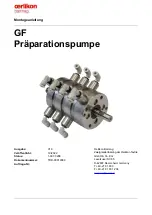
18
12. Thread the diaphragm (clockwise) fully onto the shaft.
When reinstalling a used diaphragm it is not necessary to maintain the previous orientation
relative to the reagent head or pump head hole pattern.
13. Remove the screwdriver from the oil fill hole and replace the cap.
14.
Install the reagent head bolts and tighten in an alternating pattern to ensure an even seating
force. Torque to the values recommended in
Section 6.1.
15.
Reassemble the piping connections and check valves to the reagent head, using care
to orient all check valve parts properly (refer to
figures 9 and 12).
16.
Re-prime the pump following the procedure outlined in
Section 6.3.
7.2 Diaphragm Shaft Seal
While the diaphragm is removed, inspect the shaft seal located in the pump head. If there is
evidence of damage or wear and/or oil leakage, the seal should be replaced.
1. Remove the three retainer screws and the seal retainer.
2. Pry the old seal out of the retainer.
3. Ensure the surfaces of the retainer are clean and clean of debris, scratches, or burrs.
4. Insert the new seal into the retainer by hand, do not use tools to prevent damage to the seal.
5. Inspect the piston shaft and remove any scratches, burrs, or surface corrosion or damage.
6. Lubricate the shaft with a small amount of pump oil.
7. Slide the seal and retainer back into position and secure with the three screws.
Figure 11, piston shaft seal replacement
Summary of Contents for PULSA GLM7
Page 23: ...22 Figure 14 Check valves metal construction...
Page 30: ...29 12 Dimensional Draw ings...
Page 31: ...30...
Page 32: ...31 13 Parts Diagrams and Parts Lists...
Page 35: ...34...
















































